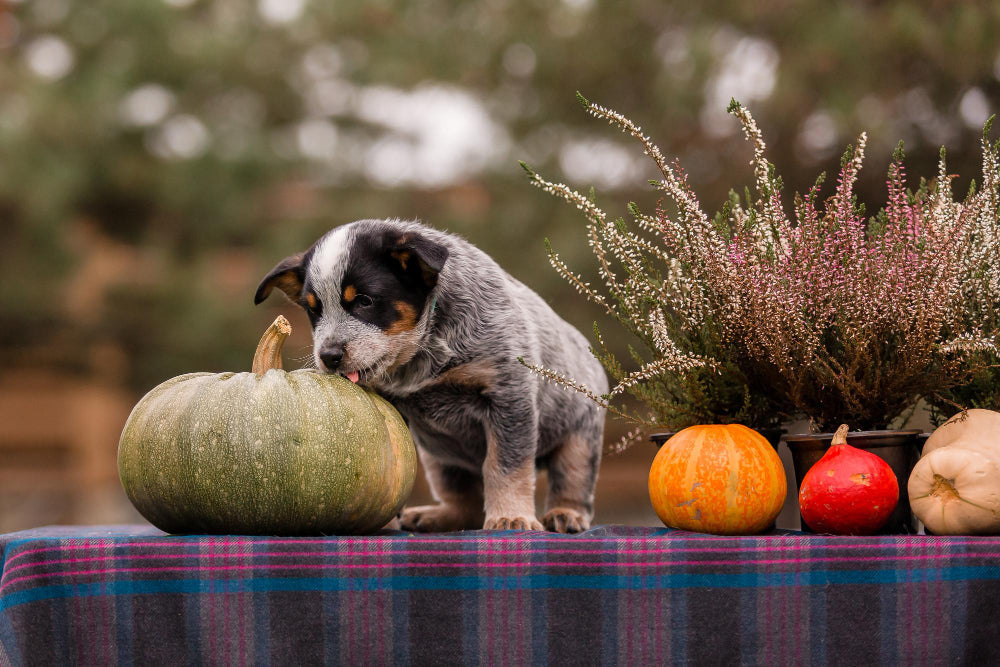
Pumpkin 101 for Dogs: Nutritional Benefits and How to Incorporate It
|
|
Time to read 5 min
|
|
Time to read 5 min
When fall arrives, pumpkins take center stage in our homes, from carving jack-o'-lanterns to whipping up pumpkin pies. But did you know that pumpkin isn't just a seasonal delight for humans? It's also a tasty treat and nutritional powerhouse for our furry friends. In this guide, we'll delve into the myriad benefits of pumpkin for dogs and explore how to include this superfood in your pup's diet.
Digestive Health. Pumpkin is renowned for its digestive benefits. It's rich in fiber, which aids in regulating bowel movements. Whether your dog is experiencing diarrhea or constipation, pumpkin can help normalize their digestive system.
Weight Management. If your dog needs to shed a few pounds, pumpkin can be a valuable ally. Its high fiber content helps dogs feel full, reducing their overall caloric intake. Plus, it's low in calories, making it an excellent addition to a weight management plan.
Nutrient-Rich. Pumpkin isn't just fiber; it's packed with essential nutrients. It's a great source of vitamins A and C, as well as beneficial antioxidants. These nutrients promote overall health and support your dog's immune system.
Vitamins are essential micronutrients that play vital roles in maintaining a dog's overall health. Among these, vitamins A and C are particularly important for various reasons:
Vitamin A
Reproduction: For breeding dogs, vitamin A is essential for reproductive health. It is involved in fetal development, and a deficiency can lead to birth defects in puppies.
Vitamin C
Plain Pumpkin Puree: The simplest way to introduce pumpkin to your dog's diet is by offering plain, canned pumpkin puree. Ensure it's unsweetened and doesn't contain any additives or spices. A couple of spoonfuls added to their regular food can work wonders.
Homemade Pumpkin Treats: Get creative in the kitchen by making your dog homemade pumpkin treats. You can find various recipes online for pumpkin dog biscuits or muffins. These treats can be a tasty way to incorporate pumpkin into their daily routine.
Pumpkin as a Meal Topper: If your dog's mealtime has become a bit mundane, consider using pumpkin as a meal topper. A dollop of pumpkin on their kibble can add flavor and excitement to their meal.
Frozen Pumpkin Cubes: On a hot day, freeze some pumpkin cubes for your dog to enjoy as a refreshing snack. These can also be helpful for teething puppies.
Pumpkin for Diarrhea: If your dog is experiencing an upset stomach or diarrhea, feed them a bland diet of plain boiled chicken and rice with a tablespoon of pumpkin. This combination can help soothe their digestive system.
Pumpkin as a Supplement
Given the fantastic nutritional benefits of pumpkin, you may want to use it on a regular basis to supplement your dog's daily diet. Weruva's Pumpkin Patch Up is a natural product that we love.
While pumpkin offers many benefits, it's essential to use it in moderation. Too much pumpkin can lead to digestive upset or an upset tummy. As a general rule, start with a small amount – about a teaspoon per 10 pounds of your dog's body weight. You can gradually increase this amount if needed, but always consult your veterinarian for specific guidance.
When it comes to feeding pumpkin to your dog, it's important to choose the right type to ensure maximum benefits and safety. The most beneficial pumpkin for dogs is organic, canned pumpkin puree or cooked, fresh pumpkin without any additives or seasonings.
Here's why these types of pumpkin are ideal for dogs:
No Additives: Look for canned pumpkin that contains only one ingredient: pumpkin. Avoid pumpkin pie filling, which often includes added sugars, spices, and other ingredients that are not suitable for dogs.
Regardless of whether you choose canned pumpkin puree or fresh cooked pumpkin, always serve it plain, without any added sugar, salt, spices, or seasonings. These additives can be harmful to dogs and may cause digestive upset.
Always use plain pumpkin puree with no additives or spices. Avoid pumpkin pie filling, which often contains sugars and spices that are harmful to dogs.
Monitor your dog's response to pumpkin. If you notice any adverse effects, such as diarrhea or vomiting, discontinue use and consult your vet.
Pumpkin should complement your dog's regular diet; it should not replace balanced dog food.
Pumpkin is not just a tasty fall treat; it's a year-round nutritional powerhouse for your dog. Its benefits for digestive health, weight management, and overall well-being make it a valuable addition to their diet. Whether you choose plain pumpkin puree, homemade treats, or meal toppers, your dog is sure to enjoy the many advantages of this superfood. However, remember that moderation is key, and it's always wise to consult with your veterinarian before making significant dietary changes for your furry friend.
With pumpkin in their bowl, your dog can enjoy a happier and healthier life, one tasty spoonful at a time.

